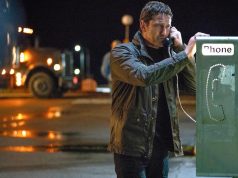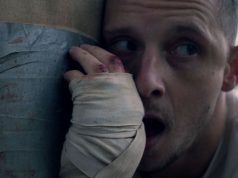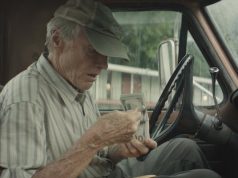I see maybe two or three films in a year that affect me like “Million Dollar Baby” did. They are the films that I enjoy as I watch them, but that I become positively rapturous about later, as it all sinks in and I process everything. The more I recall these films’ details, their emotions, their humanity, the more I love them. It goes beyond just thinking “Million Dollar Baby” is a great movie; I’ve developed an actual affection for it, like it’s my friend.
This is the 21st time that Clint Eastwood has directed himself in a movie, and it’s some of his most nuanced, delicate work on either side of the camera. Based on the stories of boxing writer F.X. Toole and adapted for the screen by TV veteran Paul Haggis, “Million Dollar Baby” nudges up against every cliche in the book without ever actually using them. It has elements of boxing movies and medical dramas, and can accurately be described as belonging to both categories — but it doesn’t indulge in the predictable, mawkish turns that those films usually take.
Much of the credit for this is due to Eastwood, I believe. The screenplay itself is good but could have become mediocre with by-the-numbers direction or if the actors had been permitted to slack off in their delivery. Eastwood keeps a steady hand, though, allowing sentimentality to seep in only when it’s appropriate, and even then only at a comfortable level. His direction is unobtrusive; his shots are not tricky or gimmicky, nor do they call attention to themselves. He simply tells the story in a warm, kindly manner, like an expert artisan methodically going about his craft.
Eastwood plays Frankie Dunn, an aging cut man and owner of a low-rent mid-city gymnasium called the Hit Pit. The cut man is not a boxer’s manager or trainer, but the guy who stands ring-side and stops a boxer’s cuts from bleeding during a match. Frankie has trained and managed, too, but he is a cautious man, too cautious to take the chances necessary to catapult a young boxer to super-stardom. He is uncertain about many things — about the boxer (Mike Colter) he’s been working with, about his religion, about himself. His oldest friend, former boxer Eddie “Scrap-Iron” Dupris (Morgan Freeman), suffered an eye injury back in the day. He works at the Hit Pit, and is thus a constant reminder to Frankie of the dangers of their sport, and of their own mortality. Neither man is getting any younger, after all.
One day a woman named Maggie Fitzgerald (Hilary Swank) comes in. She is 31 years old and wants to be a fighter. She has some natural skill but very little training, and Frankie will not take her on, simply because “I don’t train girls.” He says this — well, growls it, the way Eastwood growls things — many times over the next several weeks, as she buys a membership to his gym and practices on her own with a steely determination that eventually, of course, wins him over. Grudgingly, he agrees to train her.
Frankie and Maggie develop a father-daughter sort of relationship, with her taking the place of his absentee daughter and him taking the place of her worthless hillbilly family. They are sweet together, honest and candid with each other, but guarded about their emotions. Eddie, meanwhile, observes them, keeps his good eye on the gym, and narrates the film for us.
Eastwood is at his absolute finest as an actor, particularly in the film’s third act, when catastrophe strikes Frankie and Maggie’s world. Clint’s been playing “old” characters for years now, but I don’t think he has ever appeared as vulnerable and as rawly emotional as he does here.
Hilary Swank, who has been languishing in tepid roles in films like “Insomnia” and “The Core” since winning an Oscar for “Boys Don’t Cry,” returns to her true level of expertise as Maggie, a woman whose toughness and resilience are matched by her inner gentility.
How cool is Eastwood? He gives the film’s coolest, most Eastwood-y moment to his friend Morgan Freeman, whose performance also deserves to be noted among the year’s best. Freeman is not the Wise Old Man he usually plays; Eddie is wise, yes, and an old man, sure, but he has grit to him, a little darkness, some rough edges. And as for that cool moment I mentioned: You’ll know it when it comes.
Frankie’s strategy in boxing is the same as in life: Always protect yourself. Left unguarded, you can get hurt. The boxing-as-life metaphors that have permeated a thousand other stories never felt as true as they do in this beautiful, understated film. It is destined to become a classic.
A (2 hrs., 12 min.; )
In 2012, I reconsidered this movie for my Re-Views column at Film.com.





